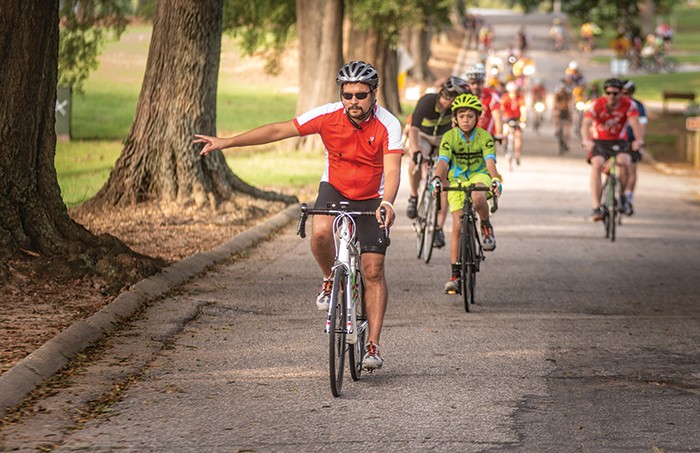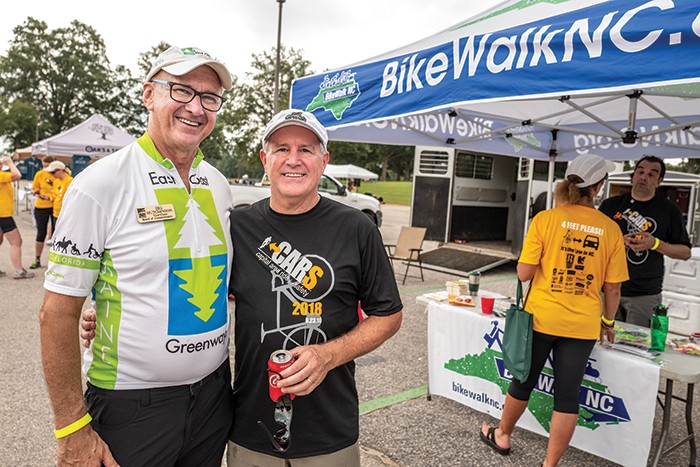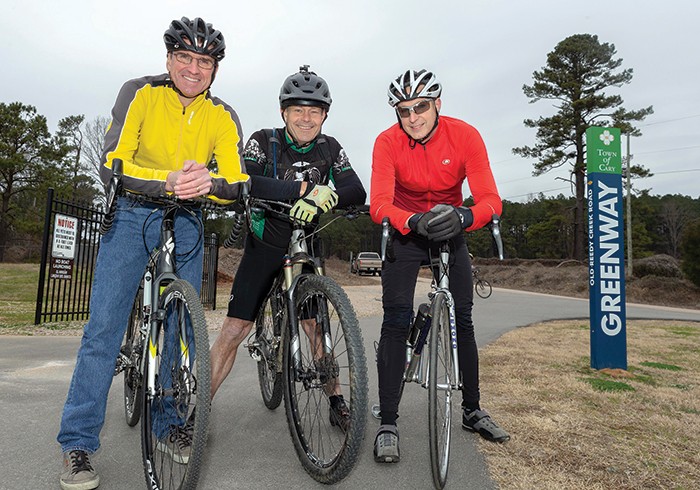The folks at BikeWalk NC want people to rethink traffic, roads and commuting.
For years, roads have been built with motorists in mind, leading to inconvenient and downright dangerous situations for pedestrians and bicyclists. BikeWalk NC wants municipalities throughout the state to consider all sorts of travelers in their plans — to create safer and more convenient ways to get around.
“It’s a mindset. It’s something that I think is changing in the leadership of our state, but it’s changing slowly,” said Heidi Perov Perry, a board member of BikeWalk NC and a longtime booster of safe cycling in Carrboro. “You can’t work your way out of congestion by building more accommodation. It just makes the congestion worse further down the road.”
Through advocacy and education, the nonprofit promotes safe bicycling, walking and other human-powered transportation throughout North Carolina.

More than 200 riders participated in the 2018 CARS ride, which encouraged safe cycling and raised money for BikeWalk NC. Photo courtesy of Simon Griffiths.
While BikeWalk NC operates mainly at the state and regional level, it has roots in the Triangle. More than a decade ago, representatives from several Triangle cycling clubs met to discuss their common goals and the need for a statewide advocacy group to work with elected officials.
“You don’t see results quickly, and the things you see today are a result of policies and procedures that were in place five years ago. You have to fight the good fight,” said Bill Hulbert, board president and Cary resident.
“You have to work within the system, but the idea is that you should at least be at the table, which we are.”
When N.C. legislators were discussing laws on bicycle safety two years ago, BikeWalk members made the most of their place at the table and were able to suggest positive changes. Among the measures in the law, which took effect October 2016, motorists are allowed to cross a double-yellow line to pass a cyclist safely. Drivers are also required to give cyclists at least four feet of space when passing.

Sig Hutchinson, Wake County commissioner, and Joe Whitehouse, lead organizer for the CARS ride, are longtime supporters of BikeWalk NC. “It’s so important for this organization,” says Hutchinson, “to be able to advocate for more kids to bike, for more infrastructure, for more funding, and for more policy.” Photo courtesy of Simon Griffiths.
Another meaningful accomplishment is the group’s annual NC Bike Summit. The three-day convention brings together nearly 300 transportation planners, community advocates, NCDOT representatives, elected officials and business owners. Topics include greenways, road safety, crash studies and new technologies like scooters and e-bikes.
“The summit really galvanized a lot of the conversations, leadership and direction of these state efforts,” said Sig Hutchinson, Wake County commissioner.
Those conversations have resulted in improved biking infrastructure, he says. There are now 200 miles of interconnected greenways in Wake County. In ten years, Raleigh has gone from having seven miles to 70 miles of dedicated bike lanes.
The annual Capital Area Ride for Safety or CARS, a fundraiser and educational event that benefits BikeWalk NC, will be 8 a.m.-2:30 p.m., Sept. 22. The ride will begin and end in Dix Park, and will include a 60-mile and a 30-mile ride, food trucks, education booths and a Kids Safety Rodeo skills clinic. carsride.org
“This is a great example of the importance of elected officials and policy,” he said. “You have to have elected leaders who understand the value of this and who are willing to put funding toward it. You’ve got to have planners who plan and implement it. None of this is by chance.
“The BikeWalk folks are really on the front lines at the state level, helping build leadership and advocate for infrastructure, funding and policy changes that promote healthy lifestyles, freedom and mobility.”
The nonprofit, with about 100 members, amplifies its impact by partnering with other groups throughout the state including the AARP, The Umstead Coalition, the Triangle Greenways Council, the Raleigh Gyros and Team CBC in Holly Springs.
Currently BikeWalk NC has its sights on how the state regulates the federal Transportation Alternatives Program, which sets aside millions of dollars for sidewalks, bike lanes and trails. N.C. requires that local communities contribute 20 percent of the cost of these projects, but smaller municipalities have had trouble coming up with the matching funds. In 2017, the state returned more than $4 million to the federal government — unspent.
“So, $4 million off the table for bike/ped facilities. That’s huge,” said Perov Perry. “Think if those communities hadn’t had to come up with the 20 percent, which wouldn’t be much on a state level, but on a local level it’s huge. We’re trying to get rid of that 20 percent local match requirement for projects.”
While BikeWalk NC advocates for big changes, there is still plenty for individuals to do. The nonprofit’s website lists ways to get involved, safety information and other resources. But to make local communities safer for walking and biking, showing up at council meetings and planning meetings has more impact than anything else, Perov Perry says.
“Seeing a person up there in front of you, as an elected official, and they’re telling you that that road isn’t safe for them or their children — that’s pretty powerful,” she said.
- Explore Carrboro: Small-town Southern Meets Hippie Chic
- Making a Splash
- Discover Manteo’s Timeless Appeal
- Nonprofit Spotlight: BikeWalk NC
- The Dirt on Composting
- Vive les Jardins Français!
- Worth the Drive: Lantern in Chapel Hill
- Kill Devil Pecan Rum from Outer Banks Distillery
- Crude Extraction from Oaklyn Springs Brewery
- Small Business Spotlight: Fount Coffee + Kitchen
- From the Editor: March 2019






